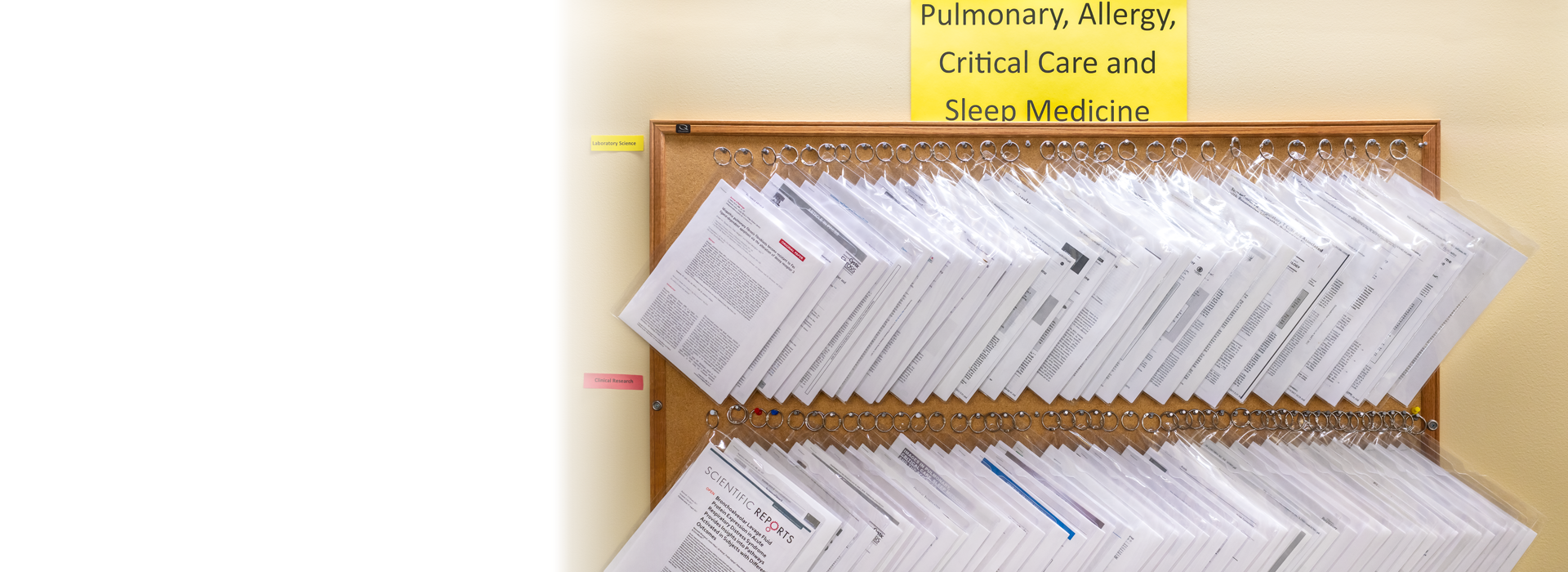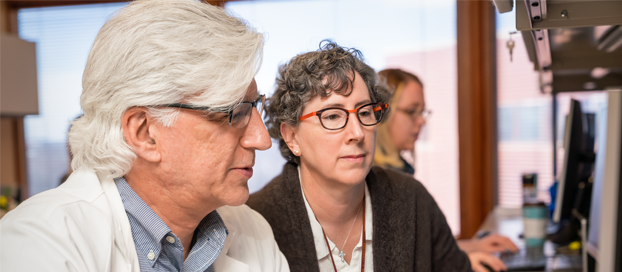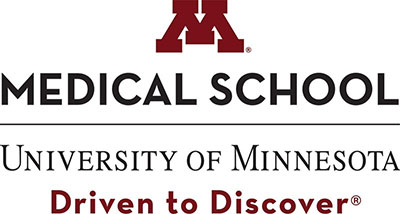
Academic Clinical Programs
Our faculty annually publish approximately 62 scholarly papers in influential journals such as the American Journal of Respiratory and Critical Care Medicine, JAMA, Critical Care Medicine, JCI, AJP, Heart and Lung Transplantation, Sleep, PLOS One and Cancer Therapy. For papers published 2010 to 2015, scholars have cited our work approximately 4000 times.
Critical Care Program
Critical care physician services in the Pulmonary, Allergy, Critical Care and Sleep Medicine (PACCS) division are delivered in an integrated Medical-Surgical-Anesthesiology-Advanced practice RN, Critical Care Program. The program has been supported by a University of Minnesota Physicians and Fairview Health Services contract since 2009.
About
For 35 years, PACCS faculty physicians staffed the MICU service at the University of Minnesota Medical Center leading the medical team of fellows, residents and medical students. UMMC is a quaternary-care referral hospital specializing in transplantation and oncology and accepting patients with complex multi-system diseases from facilities across the upper Midwest.
In 2008, in addition to the staffing the MICU service at UMMC, faculty physicians from the PACCS Division started an on-site intensivist service at the 23-bed mixed medicine-CV surgery-neuro ICU at Fairview Southdale in Edina, MN. This was one of the first examples of University of Minnesota faculty physicians establishing an academic medicine practice in a large community hospital. In 2009, in collaboration with the Division of Surgical Critical Care in the Department of Surgery, the practice expanded to the 12-bed ICU at Fairview Ridges hospital in Burnsville. Three years later, we developed the UMP-Fairview System-wide Tele-ICU program that was the first non-Federal Tele-ICU Program based in Minnesota.
The M Health-Fairview Critical Care program has matured into an integrated Medical-Surgical-Anesthesiology-Advanced Practice Provider Critical Care Service providing on-site care at six ICUs at three Fairview hospitals with 24-hour coverage at three ICUs at UMMC and Southdale ICU plus tele-ICU care to six other ICUs. This represents the largest UMP hospital-physician practice effort outside of UMMC. The program supports approximately 45 intensivists and 15 APPs housed in the academic departments of Medicine, Surgery and Anesthesiology. Between the three departments, the program staffs twelve faculty and APP intensivist daytime shifts and three physician and APP intensivist nighttime shifts at three hospitals.
In 2018-2019 with the merger of the HealthEast system into Fairview Health Services and the clinical integration of Fairview and University of Minnesota Physicians, the M Health-Fairview Critical Care program currently provides on-site or tele-ICU care at 12 ICUs in 9 hospitals under the leadership of Ron Reilkoff, MD and Dar Spiegelberg.
In 2017, the tele-ICU hub moved from UMMC to the Southdale ICU where on-site intensivists provide direct patient care and tele-ICU care to Ridges, Woodwinds, Lakes, Northland, Range and Grand Itasca ICUs. In 2021, in the aftermath of the COVID pandemic, we created a M Health-Fairview system-wide ICU triage program to prioritize placement of critically ill patients from the five-state region.
Clinical practice standards and quality improvement programs for 12 ICUs that use a common EMR (Epic) are supported by a system-wide steering committee comprised of ICU medical and nursing directors, clinical nurse specialists and pharmacists assisted by ICU system analysts and administrators.
The Critical Care program focuses on care standardization to improve patient outcomes but also to minimize the effects of practice variability for clinical trials in sepsis, sedation and ARDS. For instance, there are common ventilator order sets, RT-driven weaning protocols and bronchoscopy BAL collection techniques. Adjunctive therapies for mechanically ventilated patients such as sedative drug selection and daily stops, prone positioning, order-set mandated sedation goals, early mobility and enteral feeding protocols and rounding checklists are standardized. Junior intensivist faculty in the three Departments gain experience in QI and system standardization preparing them for ICU medical directorships, database research projects and implementation of new clinical practices.
Educational Activities
PACCS faculty intensivists supervise the 4th-year Medical-student sub-internship clerkships at UMMC, Ridges and Southdale hospital. This mandatory clerkship started in 2015 and teaches the basics of life support and ICU care to approximately 200 students per year. Ron Reilkoff, MD from PACCS is the clerkship director.
Since July 2018, there is a month-long GME-supported critical care rotation at Southdale ICU for fellows from Medicine, Surgery or Anesthesiology programs. The fellows gain experience in managing complicated medical, CV surgery and neurocritical care patients in a single unit with direct attending-to-fellow supervision.
The MICU service at UMMC has long provided an excellent educational experience in tertiary critical care for the P/CC fellows and residents in the University of Minnesota Internal Medicine Residency programs. In 2011, intensivists from the three academic Departments started over-night in-house coverage at UMMC for both the SICU and MICU services. This allows nighttime residents from either the Medicine or General Surgery residencies to interact with faculty intensivists trained in other critical care pathways. This cross-training experience is likely unique amongst U.S. IM residency training programs.
There is a joint fellowship education curriculum between the medical and surgical critical care fellowships with monthly conferences held in the Surgery Conference Room.
Scholarly Activities
Faculty from the Critical Care program publish approximately 10 papers per year from clinical observations or trials performed at UMMC and Southdale ICUs. PACCS faculty have recruited subjects for proteomic studies and instilled T3 in ARDS; and randomized trials in patient-controlled sedation, COVID and early sepsis management. These studies have been supported by R-01 (NHLBI), R-21 (NINR), P-50 (NIGMS) and University of Minnesota KL-2 grants. About 1/3 of the PACCS fellows’ scholarly output is related to critical care issues.
Physicians
Cystic Fibrosis Program

Specialty pulmonary clinics diagnose and treat the most difficult diseases. We provide coordinated care to patients over a lifetime while working to discover life-enhancing therapies. Jordan Dunitz, MD and Joanne Billings, MD, MPH have led the University of Minnesota Adult Cystic Fibrosis Program to one of the top-ranked programs in the country while enrolling hundreds of patients in clinical trials sponsored by the Cystic Fibrosis Foundation Therapeutics Development Network.
The Minnesota Cystic Fibrosis Center care team has broad-based clinical and scientific expertise, meeting the challenge of successfully diagnosing, treating, teaching, and performing research to understand and control all of the potential complications of Cystic Fibrosis (CF). This CF care team, after 40 years of evolution, now defines the full range of resources that are needed to provide comprehensive and cost-effective care for cystic fibrosis.
Interstitial Lung Disease and Pulmonary Fibrosis Program

Interstitial Lung Disease Program at the University of Minnesota fosters a multidisciplinary approach to the diagnosis and treatment of interstitial lung disease. The Pulmonary Fibrosis Foundation has selected our clinic as a Pulmonary Fibrosis Care Center Network, one of only 40 in the nation. We have physicians with specialties in:
- Environmental Exposures
- Interstitial Lung Disease
- Lung Transplantation
- Pulmonary Fibrosis
- Sarcoidosis
- Scleroderma
About
This multidisciplinary approach includes collaboration with specialists in rheumatology, thoracic radiology, pulmonary pathology, sleep medicine, lung transplantation and thoracic surgery. Our dedicated group of professionals will diagnosis and treat your overall symptoms to find the exact reason you are having problems.
The Pulmonary Fibrosis Care Center Network (CCN) sites are committed to improving the quality of care for individuals with pulmonary fibrosis. As a result of this multidisciplinary team approach, patients benefit from receiving an accurate diagnosis, obtaining recommendations for continuing care, gaining assistance in acquiring essential social services, and having the opportunity to participate in collaborative research. CCN sites work with the Pulmonary Fibrosis Foundation to actively engage their local pulmonary fibrosis communities to enrich patients’ quality of life, conduct educational events, and facilitate research initiatives.
To assist in patient management, the ILD program uses pulmonary function testing for both new and established patients. The 7-bay PFT lab performs about 12,000 tests annually and is supervised by Ed Corazalla MS, RPFT with medical direction by Hyun Kim MD. PACCS pulmonary faculty interpret the results of spirometry, DLCO, plethysmography, N2 washout, lung clearance index, shunt study, ABGs, six minute walk testing and methacholine challenge tests. The lab also performs sputum induction, aerosol inhalation therapy such as pentamadine, 02 titration and 02 qualifier studies. The lab is certified for both clinical and research use and performs tests for numerous research studies including ILD, CF, Pulmonary Hypertension, LVADs, HIV and oncology medication lung toxicity studies.
The University of Minnesota Medical Center is ranked a high-performing hospital by US News & World Report, in 12 adult specialties, pulmonary medicine being one of those specialties. Our advanced technologies such as multislice spiral CT and transplant services were rated highest as is the survival following admission. We are able to offer patients clinical trials because of our long standing robust research program. We are committed to maintain a high standard for clinical care as we continue to be on the forefront of efforts to seek new ways to improve the lives of our patients.
Interventional Pulmonology Program
The University of Minnesota has a combined Interventional Pulmonology and Thoracic Surgery Minimally Invasive Programs that offer a wide spectrum of diagnostic, therapeutic and palliative procedures for various lung, airway and pleural diseases.
About
The University of Minnesota has a combined Interventional Pulmonology and Thoracic Surgery Minimally Invasive Programs that offer a wide spectrum of diagnostic, therapeutic and palliative procedures for various lung, airway and pleural diseases.
The program has a multidisciplinary approach to every single patient to deliver the most appropriate procedure and treatment without delaying care. This is a unique feature among similar programs in the country. We also offer a multidisciplinary Lung Nodule Program that involves Lung Nodule Clinic, Lung Cancer Screening Program, Lung Tumor Board and weekly Lung Nodule Meeting attended by Thoracic Surgeons, Pulmonologists, Chest Radiologists and Interventional Radiologists.
In addition, we have the only Complex Airway Center in the region and are a leader in treating benign and malignant airway diseases. This center holds experts from Thoracic Surgery, Interventional Pulmonology, Otolaryngology and Head & Neck Surgery.
The Interventional Pulmonary & Nodule Clinic at the Masonic Cancer Center sees about 600 new patients per year and 600 return visits. We also see 200 new patients per year at the IP and Nodule clinic in Maple Grove and Ridges Specialty Clinic in Burnsville.
The PACCS IP physicians perform 650 OR cases annually: ~300 complex airways, 250 EBUS, 40 intrabronchial valve placements and 50 navigational bronchoscopies. In the Endoscopy Unit on the East Bank campus, PACCS pulmonologists perform approximately 700 bronchoscopies (500 outpatient and 200 in-patient) of which 400 are transbronchial biopsies cases with fluoroscopy.
Services
- Lung Cancer Screening
- Diagnosis, follow up and Treatment of Pulmonary Nodules
- Diagnosis and treatment of Airway Diseases
- Diagnosis and treatment of Pleural Diseases
- Diagnosis of Mediastinal/hilar Lymph Node
- Bronchoscopic Lung Reduction for Emphysema/COPD
- Bronchoscopic Treatment of Bronchopleural Fistulas
- Whole Lung Lavage for Pulmonary Alveolar Proteinosis
- University of Minnesota Cancer Care
- Section of Thoracic & Foregut Surgery
The Team
Interventional Pulmonology
- H. Erhan Dincer, MD (Director, Interventional Pulmonology & Bronchoscopy)
- Abbie Begnaud, MD
- Roy Cho, MD
- Heidi Gibson, RRT
- Joseph Keenan, MD
- Alireza Nathani, DO
- Jennifer Wong, MD
Thoracic Surgery
- Rafael Andrade, MD (Chief, Section of Thoracic & Foregut Surgery)
- Amit Bhargava, MD
- Heather Lundberg, CNS, OCN
- Madhuri Rao, MD
- Gail Summerville, CNS
Medical Oncology
- Robert Kratzke, MD
- Naomi Fujioka, MD
- Manish Patel, DO
Radiology
- Tadashi Allen, MD
LUNG TRANSPLANT AND ADVANCED LUNG DISEASE

The lung transplant program at the University of Minnesota is one of the most active and most experienced in the nation, averaging approximately 45 transplants per year; and having performed over 1,000 transplants over the history of the program. Fellows rotate on the CF/Lung Transplant inpatient transplant service during their first year and have opportunity for lung transplant outpatient clinic experience during their second and third years. The U of M transplant program transplants patients with many types of advanced lung disease including COPD, ILD, cystic fibrosis and pulmonary hypertension--allowing fellows to gain experience in pre- and post-transplant management of these patient groups. The transplant team is multidisciplinary, including providers from Pulmonary Medicine, Cardiovascular and Thoracic Surgery, Internal Medicine, Pharmacy, Nutrition, and Social Work.
Sleep Medicine Program
The M Health Sleep Program see patients at eight locations in the metro area as well as outreach visits in Hibbing and performs remote reads for Winona Health. The program has 30 beds with full polysomnography capacity. Sixteen physician or PsyD providers are supported by 35 technicians and advanced practice providers. The program sees about 9500 new patients and performs 6800 in-lab studies and 2000 home sleep studies per year. 7000 patients with home PAP devices have data downloaded daily into Epic creating a large database for patient care and research. When needed for refractory OSA, Dr Hsia from the Department of Otolaryngology surgically implants the Inspire upper airway stimulator.
The Team
Sleep Medicine (South Metro)
Bimaje Akpa, MD (Fairview Southdale)
Conrad Iber, MD (Fairview Burnsville)
Snigdha Pusalavidyasagar, MD (Fairview Burnsville)
Sleep Medicine (UMMC/Riverside Clinic)
Akinbolaji Akingbola, MD
Tereza Cervenka, MD
Conrad Iber, MD
Snigdha Pusalavidyasagar, MD
Sleep Medicine (Maplewood)
Akinbolaji Akingbola, MD
